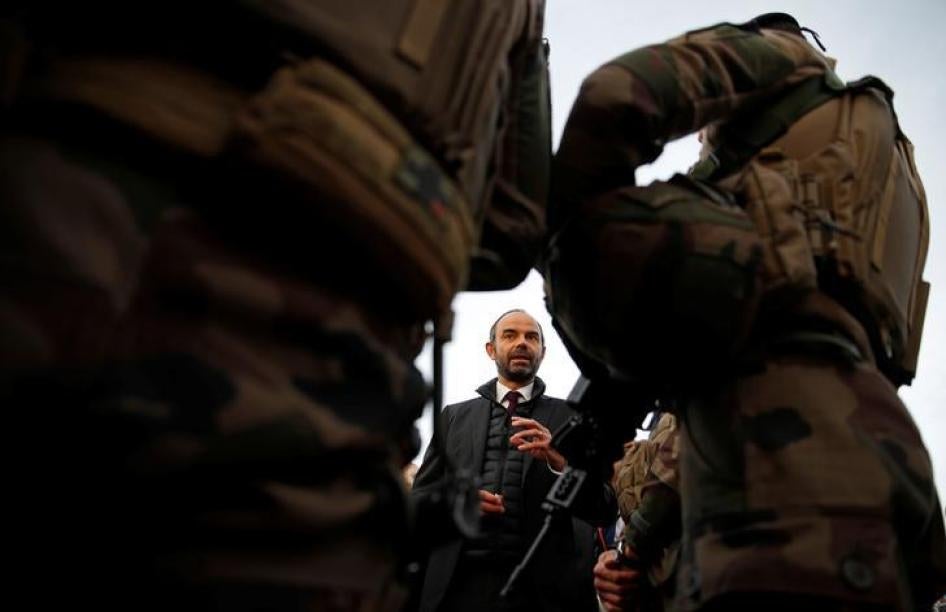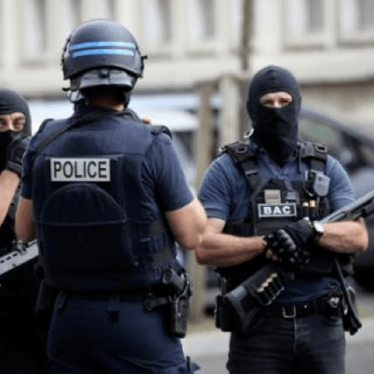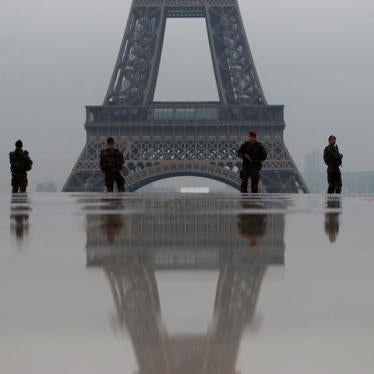France’s two-year-long state of emergency is in the process of being lifted. Does that mean all will return to normal, to the way things were? No, decidedly not. Far from offering a return to normality, November 1 marks the start of a troubling “new normal” for people living in France.
The gap left by the formally declared state of emergency will be filled by the new Law to Strengthen Internal Security and the Fight Against Terrorism. The new law takes elements of executive and police powers used during the state of emergency and makes them part of “normal” administrative and criminal law.
International human rights standards are clear about states of emergency. Governments can declare a state of emergency where there is a threat to “the life of the nation,” but the measures that follow must meet strict tests of necessity and proportionality. Crucially, the primary aim of any state of emergency should be ensuring the conditions to allow a return to normal policing subject to judicial controls.
What we have seen since June in France is something altogether different. The state of emergency was initially imposed for just 12 days by President Hollande after the horrific attacks in and around Paris on November 13, 2015. But it was extended time and time again. And President Macron’s exit strategy is not premised at all on a return to normal policing subject to the same judicial controls that existed before. Instead, the legislature has effectively granted new, wide-ranging powers to police and prefects, treating these powers as the “new normal,” while at the same time weakening judicial scrutiny over how some of those powers are used.
Take one of the new powers, for instance, “individualized administrative control and surveillance measures,” which broadly replaces the system of “assigned residence orders.” These measures allow a prefect, without any prior judicial authorization, to require a person deemed a threat to national security to limit their movements to a specified geographical area, to report daily at a fixed hour to a police station, to notify the police if they change residence, and to agree to wear an electronic surveillance tag. A variant of this power under Article 228-4 can also bar a person from being in particular places within that fixed geographic zone.
The state isn’t required – as it would be in “normal” criminal cases – to disclose the evidence of criminal activity to the accused so the person whose activities are restricted can mount a defense. These restrictions can last for up to a year, through a system of periodic quarterly renewals, with limited judicial oversight. Any violation of the specific measures carries a possible punishment of up to 3 years in prison and 45,000 euros.
Last year, I spoke to a man who was subject to a (now-lifted) assigned residence order, who said that he found himself in a state of “constant paranoia” at the thought of missing his appointment to sign-on at the police station by a few minutes because of a delay in dropping a child off at school en route, being stuck in traffic, or running out of fuel, all of which were daily realities for him. He said the idea that he could end up in prison without having committed a crime was “humiliating.”
The law also includes troublingly vague language allowing prefects to order a place of worship closed, and contains ill-defined grounds for prefects to order the effective lockdown of a zone for enhanced security searches as a “perimeter of protection.” And an addition at a late stage to the law extends the areas where the police can search people without a warrant to a 10-kilometer radius of ports, airports, and international train stations. Just stop and consider for a second how much of France’s population lives or works within 10 kilometers of the three international train terminals in Paris alone, Lille-Europe, Lyon-Part-Dieu and Marseille-Saint-Charles, ports in Calais, Le Havre and Marseille, let alone the international airports across France. If you don’t think this could affect you, think again.
Poorly worded terrorism laws open the door to abusive interpretation by authorities. Overreaching abusive interpretations, in turn, can be counter-productive to guaranteeing security. Particularly so, when the country in question already has a poor track record on ethnic profiling during stop-and-search operations.
Our concerns, which we have voiced time and time again since a draft law was first proposed four months ago, are shared widely by those who are concerned about protecting people’s rights. Other organizations –the Syndicat de la Magistrature, the Human Rights League and Amnesty International – have raised repeated concerns. So too has the Defender of Rights, the domestic human rights oversight authority. Leading law professors and parliamentarians have done so also. And the international human rights oversight bodies of the Council of Europe and the United Nations have registered significant concern.
Some will no doubt contend that these laws are needed because these are not “normal” times, that the terrorist threat requires these new measures. However, this reasoning is dangerous. Passing legislation that enshrines abusive practices allows a government to be seen to flex its muscle, but in practical terms the effectiveness of that approach remains questionable.
A parliamentary commission of inquiry into the Paris attacks concluded in July 2016 that the state of emergency had “limited impact” on improving security. The panel also described widespread failures in analyzing intelligence that could have helped prevent the attacks. The government has not explained clearly to Parliament whether emergency powers or pre-existing police and intelligence powers have been used in foiling more recent plots.
At its heart, this new law undermines some of the basic precepts of the rule of law and human rights and the way people in France have understood and lived in their democracy since World War II. Under the state of emergency, punishment has become pre-emptive. Vague suspicion is enough. And overly broad definitions of what is dangerous behavior open the way to abuse. That is, at best, a deeply impoverished version of “normality.”










